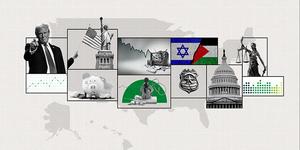GALLUP NEWS SERVICE
PRINCETON, NJ -- With the war in Iraq dominating U.S. news and with a potential fight looming between the White House and Congress when Gen. David Petraeus, commander of U.S. forces in Iraq, reports on the progress of the troop surge next month, the opinions of the average American citizen are vitally important. There has been an enormous amount of public opinion polling on Iraq since the war began in 2003, particularly over the last year. What follows is a brief updated outline of key points about Americans' views of the war.
1. The Iraq war is an extremely high priority for Americans.
A wide variety of measures show that the war in Iraq is perceived by the American public as the nation's top problem at this time, and as the top priority for government. Unless there is a significant change between now and next year, the war is likely to be one of the top issues in the 2008 presidential and congressional elections.
Thirty-five percent of Americans name Iraq as the "most important problem" facing the country today, by far the most dominant issue mentioned. Iraq has been the No. 1 issue on this question since April 2004.
Nearly 7 in 10 Americans choose Iraq as the top priority for the president and Congress to deal with, far and away the most frequently mentioned issue in response to this question. Iraq has also topped this list since this question was first asked by Gallup in April 2006.
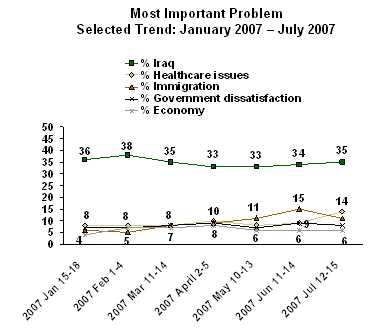
Two-thirds of registered voters say the war in Iraq will be "extremely" or "very important" to their 2008 presidential vote.
2. A majority of Americans continue to say it was a mistake for the United States to have become involved in Iraq.
In Gallup's latest poll conducted in early August, 57% of Americans said it was a mistake to send troops to Iraq, while 42% said it was not. That is typical of the responses to this "mistake" question all year. In fact, no less than 48% of Americans have called the war a mistake in every Gallup poll taken since August 2005.
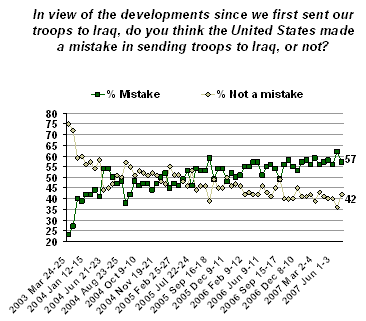
Gallup has been using this "mistake" question format to measure public opinion about wars going back to the Korean era. Less than a majority of Americans called the Korean War a mistake for most of its duration, but a majority of Americans consistently called the war in Vietnam a mistake from August 1968 on.
In contrast to the war in Iraq, most Americans continue to be supportive of U.S. military action in Afghanistan, as they have been since it began in October 2001. Twenty-five percent of Americans in the early August poll said it was a mistake to take military action to Afghanistan, while 70% said it was not a mistake
3. A majority of Americans perceive that the benefits of winning the war in Iraq do not outweigh the costs involved and Americans are not convinced that the war is a part of the war on terrorism. Still, there are mixed views of the impact on terrorism if the U.S. withdraws its troops from Iraq.
With negative perceptions of the war's progress as a backdrop, it may not be surprising that the public sees little upside for Americans in the cost-benefit trade-off of continuing the war in Iraq.
By a nearly two to one margin, 65% to 31%, Americans in January of this year said the benefits of winning the war in Iraq to the United States were not worth the costs the United States would have to bear in order to win it.
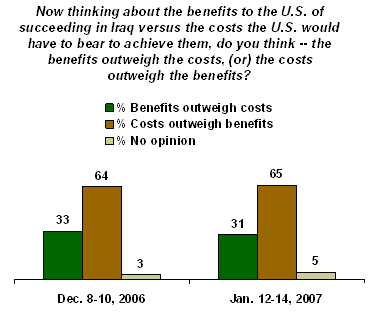
Asked in mid-June 2007 if the war in Iraq is part of the war on terrorism, 43% of Americans said it was, while a slight majority, 53%, said it is an entirely separate military action. A recent CNN/ORC poll showed that 42% of Americans say the war with Iraq has made the U.S safer from terrorism, while a slightly higher percentage, 49%, say it has made it less safe.
But Americans' views on the impact on the war on terrorism of withdrawing U.S. troops from Iraq are more sharply divided. The CNN poll found that just about as many Americans say that the chances of a terrorist attack in the U.S. would be higher if the country withdraws troops from Iraq as soon as possible as say the chances of a terrorist attack would be higher if the U.S. keeps its troops in Iraq.
4. There has been a recent increase in the percentage of Americans saying that it is making things better in Iraq, although a majority of Americans still do not agree that the troop surge is having a positive effect,
Gallup's early August poll showed that 31% of Americans said the recent surge of U.S. troops in Iraq is making the situation there better. That's a nine-point increase (up from 22%) since early July. Still, the majority of Americans say the troop surge is not making much difference or is actually making the situation worse.
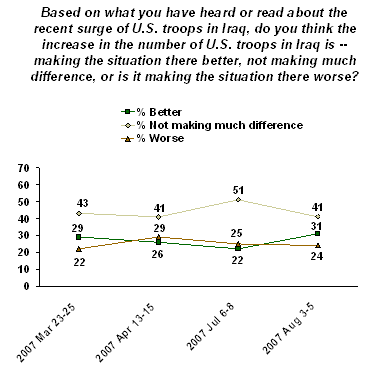
5. Americans are apparently conflicted on the issue of how best or when to remove troops from Iraq. While most Americans support the broad principle of a timetable for removing troops from Iraq within the next year, relatively few believe that all troops should be withdrawn immediately.
Public support remains high for the general concept of a timetable to withdraw most U.S. troops from Iraq. According to the early August Gallup poll, 66% of Americans favor removing all U.S. troops from Iraq by April of next year, except for a limited number involved in counter-terrorist operations. Last month, 71% favored this proposal.
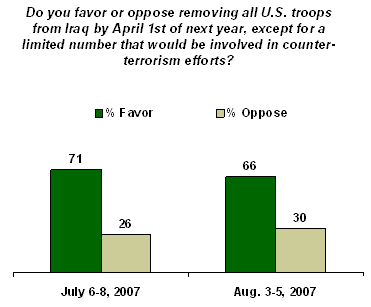
But previous Gallup polling shows that relatively few Americans want immediate withdrawal of troops from Iraq. And, a recent ABC News/ Washington Post poll finds that only about one-third of Americans support the concept of the U.S. withdrawing all of its troops now. The rest say the U.S. should begin to withdraw troops, keep troop levels the same, or increase troop levels.
6. A majority of Americans do not want Congress to take action on Iraq until the mid-September report of Gen. David Petraeus, who is highly respected.
Even with sustained opposition to the war and majority support for some type of timetable to withdraw U.S. troops from Iraq, Americans say they are willing to wait until September before setting a new course in Iraq. At that time, Gen. David Petraeus reports to Congress about the progress of the war effort. Fifty-six percent of Americans are inclined to wait until then for a new Iraq policy, while 39% say Congress should develop a new policy now. These views are little changed from last month.
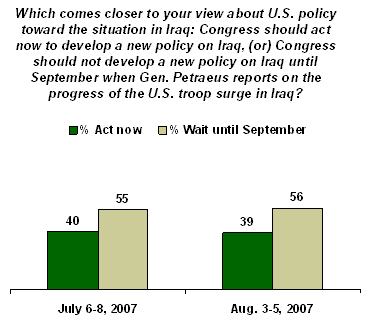
More generally, Americans have more positive than negative views of Petraeus, by about a two to one ratio -- although 32% of Americans are not familiar enough with Petraeus to rate him. Opinions about Gen. Petraeus are already highly political. Republicans with an opinion are overwhelmingly positive about Petraeus; Democrats are split.
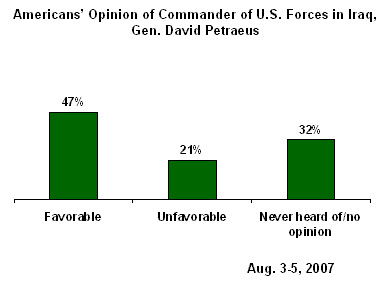
Earlier this year, a Gallup Panel survey showed that Petraeus had a higher credibility rating on Iraq than any of 16 other individuals tested -- including President Bush, Vice President Cheney, Secretary of Defense Robert Gates, or such presidential candidates as Hillary Clinton, Rudy Giuliani, John McCain, and Barack Obama.
7. Democrats are better positioned than the Republicans on handling the issue of Iraq.
Since 2005, the public has perceived that Democrats are better able than Republicans to handle the issue of Iraq. Prior to this, Americans gave the Republicans the edge. Americans also say they trust the Democrats in Congress more than the administration when it comes to making decisions on Iraq.
But, a recent CBS News/ New York Times poll finds that while Americans are more likely to approve of the way the Democrats in Congress rather than the Republicans in Congress are handling the situation in Iraq, approval ratings for both parties are dismal. Thirty percent of Americans approve of the way the Democrats in Congress are handling the situation with Iraq and 22% approve of the way the Republicans in Congress are handling Iraq. These results are typical of what Gallup and other polling firms have found this year.
8. War views are highly partisan.
Views of the Iraq war are sharply divided along partisan lines -- perhaps not surprising given the degree of identification the war has with the Republican Bush-Cheney administration. Republicans overwhelmingly support the war; Democrats overwhelmingly oppose it. Independents are more likely to oppose than favor the war.
About three-quarters of Republicans say that sending troops to Iraq was not a mistake. By contrast, Democrats, by a 60-point margin, say it was a mistake.
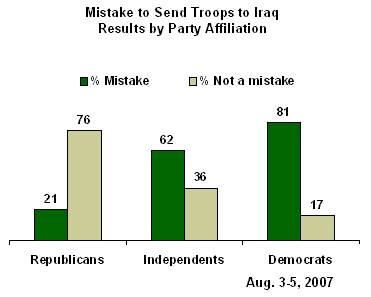
The same partisan differences emerge when Americans are asked to evaluate the impact of the recent surge in Iraq. Sixty percent of Republicans say the recent troop surge in Iraq is making the situation there better, while 7% say it is making it worse. Among Democrats, just 7% say the troop surge is making the situation better, while 39% say it is making it worse and 51% say it is making no difference.
Upwards of 9 in 10 Democrats support removing all U.S. troops from Iraq by next April, but among Republicans, only 41% support this plan.
Nearly three in four Republicans say Congress should wait until Petraeus' report on the progress of the troop surge to develop a new policy on Iraq. Democrats are more divided as to whether Congress should act now (50%) or wait until September (44%).
Support for past U.S. wars -- including Vietnam -- was not as polarized along party lines as the current war. Gallup data from 1968 and 1969 show that a little more than half of Americans said it was a mistake to send troops to Vietnam. Fifty-one percent of Democrats agreed with this position at the time, as did 55% of independents and 56% of Republicans -- remarkably little differentiation.
9. Men are more likely to support the war in Iraq than are women.
There is a significant gender gap in terms of attitudes on the war. Women are more likely than men to say it was a mistake and to support a timetable for removing U.S. troops. This is probably because women are more likely to identify as Democrats than are men, but in general women are less likely than men to favor military action regardless of party identification.
Sixty-one percent of women say it was a mistake to send troops to Iraq, compared with 52% of men.
Slightly more than 7 in 10 women support a timetable for removing troops from Iraq by next April; 59% of men agree.
For further details, see Related Items.
